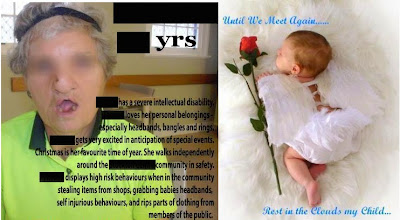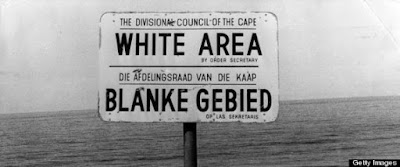The Dead Kid Card

Uncharitable post ahead - warning.
There's an awesome movement going on in Australia that has one of the most potentially inappropriate names ever, given that it is around playgrounds - 'Touched by Olivia'. Let me tell you about it.
Olivia was a little girl - a baby, really - who died of some awful rare disease in 2006. Like so many parents who have lost a child to some tragedy, her mum and dad decided that they wanted to give her life meaning by working for something really worthwhile. So they started this campaign for inclusive playspaces, called 'Touched by Olivia'. It is a great campaign, with incredible successes - check it out. http://touchedbyolivia.com.au/
But the campaign began in the name of a Dead Kid.
The campaign itself is not my issue. Not at all. Any time something good can come out of something terrible, that is a good thing. I understand that grief and anger is often best channeled into something productive, and I have seen this over and over again. Drink driving campaigns, changes to laws around domestic violence and other crime, all those things often come out of awful tragedies, fuelled by the will of a family to make it right. The 'Coward Punch' campaign is a good example.
But the other side of it is this - when your child dies, especially senselessly, you win something at the same time that you lose something, something that can never be replaced. Whether you like it or not, you now own a Dead Kid Card.
How you play that card is not my concern. I truly believe that there is no intentional exploitation by families to on-sell the image or memory of their Dead Kid - it is always, always out of a genuine desire to commemorate someone dear to them, to make a difference for others in the name of their loved one. What I am interested in, and critical of, is our willingness to engage with that process. We, the consumers of inspiration porn, pity porn and grief porn, especially in the disability sector.
Here are some examples.
Damian and Rae Panlock established the Brodie’s Law Foundation in memory of their 19-year-old daughter, Brodie, who tragically took her own life in 2006 after being relentlessly bullied at work. The Alannah and Madeline Foundation was set up in memory of Alannah and Madeline Mikac, aged six and three, who were killed with their mother and 32 others at Port Arthur, Tasmania, on 28 April 1996. Children365 was developed after the death of Darcey Freeman, aged four, in January 2009. Following her death, it was the wish of the family that there be some positive action out of such a terrible tragedy.
There are thousands of these things. I think that it is wonderful that a young life should be commemorated, that someone's name should be remembered in a positive way, that good can come out of senselessness and brutality.
But then there is the Dead Kid Card response. I think it is fuelled by the same wave of grief porn that incited people to put cricket bats outside their homes, to march with 30,000 others to mourn Jill Meagher's senseless murder, to place a sea of flowers outside a cafe at Martin Place. Collective grief and pity, united and incited.
Here's the question - why are we more willing to support laws and donate money or take action in memory of a Dead Kid than a Live Adult?
This applies especially to the disability sector. There is nothing more powerful than an Angel Baby. It is unarguable, unassailable. That parent now has the card that they never wanted, a powerful hand, a bargaining chip in some war or another to make something right. They are afforded a heartbeat of respect, a genuine outpouring of sympathy, a real desire to make amends for something unfixable, to do something, anything, to help.
But what about the live babies, those who have grown to often unattractive adulthood? The ones who are unsupported by governments - some people with disability cannot afford more than two showers a week - and disregarded by society? Those who are isolated and segregated and excluded and ignored? Why do we not care about those people, too?
Their images are not marketable - their stories are not appetising. Compare Iris, who snatches headbands off babies in public and lives in an institution and has no teeth, to Jessica, who died at six months and is forever frozen in a beautifully frozen Photoshopped montage on a screen at a charity ball. Iris is never going to be able to compete with the Dead Kid Card. And Jessica will never grow up to drool in public, or shout at strangers, or snatch headbands from babies. We don't need to shut her away in an institution, nor address her support issues. Yet we're happier to donate our Dead Kid dollars, march in a Dead Kid March, attend a Dead Kid Ball, than we are to lobby for Iris.
Iris's image and story was used some months ago in a campaign by parents to keep an institution open. No Dead Kid Card available to play, and pity won't work - Iris's image is not a commercially acceptable one. She is not young, nor is she portrayed as being beautiful - nobody cared enough about her to save her teeth. And so the advertising tells us that we should be afraid of Iris, that she does not belong in the community - the meme uses fear and pity to tell us why we should campaign against the closure.
No 30,000 strong marches for Iris, let alone her rights to live in the community amongst others. No bats placed outside the door as a show of support for former cricketer David, who broke his neck and has lived in a public hospital for thirty years. No sea of flowers for Joanie, who was raped in care dozens of times and is still stuck in the same group home with the same staff who covered up her rape.
To all the parents of those beautiful children lost - because all children are beautiful - I extend my sympathies and warmest thoughts and support to you at Christmas time, the hardest of all days. Like many other parents, I am no stranger to miscarriage, stillbirth and death, which has touched my immediate family. But to the rest of Australia - let's stop this unhealthy obsession with grief porn, and give equal time and attention to the living, especially those who are exceptionally marginalised.
Let's make 2015 Year of the Live Adult.
Image description - On one side of the image is a sleeping baby, dressed in an angel costume, with wings. The text reads 'Until we meet again, rest in the clouds, my Child...' On the other side of the image is an image of a middle aged woman wearing a headband. Her eyes have been pixellated to conceal her identity, as have her details. She has no teeth. The text reads 'yrs - has a severe intellectual disability. loves her personal belongings, especially headbands, bangles and rings. gets very excited in anticipation of special events. Christmas is her favourite time of year. She walks independently around the community in safety. displays high risk behaviours when in the community, stealing items from shops, grabbing babies headbands, self injurious behaviours and rips parts of clothing from members of the public.



The 1990 film 'Struck by Lightning' addressed a similar point about how the disabled suddenly became invisible to support services and fund raising once reaching adulyhood.. 25 years on and nothing has changed...
ReplyDelete